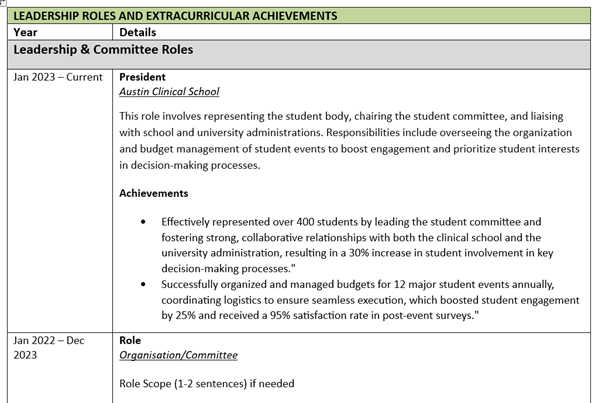AMA Victoria made this resource available to members only.
Get access to all of AMAV's articles, events, and more by joining today.
- Access all member-only resources from AMAV
- Dig deeper into the subjects that matter to you
- Get in depth articles to achieve your professional goal
Already a member? Log in
When crafting the "Leadership and Extracurricular Achievements" section of your resume, it’s common for interns and doctors in training to encounter challenges.
Understanding what to include, how to format it, and the level of detail required can feel overwhelming. Some of you will be required to use a standard template i.e. PMCV resume template others will have the freedom to craft their own resume, which provides a lot more flexibility.
Irrespective of the template here’s a structured approach to help you navigate these questions effectively and showcase your unique capabilities.

What to include:
This section is your opportunity to shine outside of your academic achievements. You have the freedom to express your personality and give potential employers insight into who you are beyond being a clinician. Consider including:
- Leadership roles: Academic, non-academic, community, or professional.
- Teaching and mentoring: Both formal and informal roles.
- Other roles: This could be entrepreneurial activities, involvement in sports, cultural, artistic, or business endeavors, and social enterprises.
- Extracurricular involvement: Any notable participation in sports, music, community projects, or other areas.
We would encourage you to have a separate ‘Professional Development’ section, however the PMCV template doesn’t allow for this. Therefore, if you are required to use this template we would suggest you include this information in this section.
- Professional development: Non-academic courses, certifications, accreditations, or conferences.
Organising the content:
First, gather all potential content and categorise it into subgroups such as leadership roles, professional development, etc. Organising content into these subgroups helps in maintaining a clean, structured resume layout. Here are some steps to consider:
- Use subheadings: Clearly separate different categories using subheadings. This makes your resume easier to scan and allows readers to quickly grasp your diverse experiences.
- Reverse chronological order: List your experiences from most recent to oldest, providing context and showing your growth over time.
- Highlight achievements: Under each role, list one or two key achievements. This not only outlines what you have accomplished but also the impact of your involvement.
Formatting tips:
- Bold and merge rows for subheadings: Make subheadings stand out by bolding them and possibly shading the row.
- Detail each role separately: Assign each role its own row to keep the resume neat and organised.
Example for clarity:
(Role Title) - (Location) | (Dates) Achievements:
Managed a team of X, achieving Y.
Developed Z initiative, enhancing [specific outcome].
What this might look like in the final version:

Remember:
While these formatting tips are geared towards Word or PDF versions of your resume, it's important to note that when uploading to the PMCV APS online form, the original formatting won't carry over. However, the organisational structure suggested here remains crucial and should be adhered to, even in the online form.
This section of your resume is a powerful tool to distinguish yourself from other candidates. Use it wisely to reflect your individuality, skills, and the value you can bring to a potential employer. Good luck!
